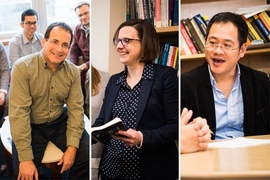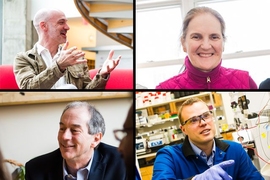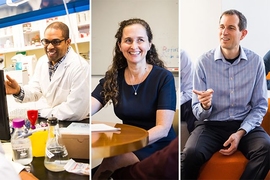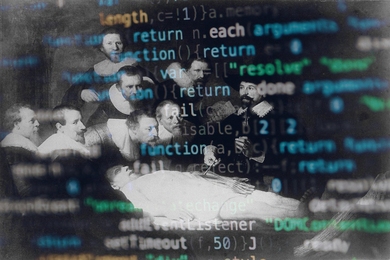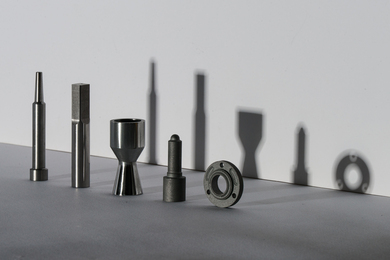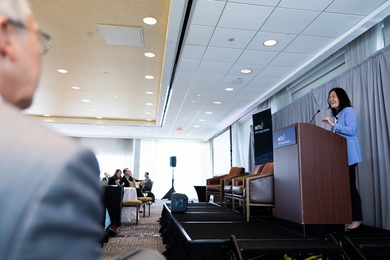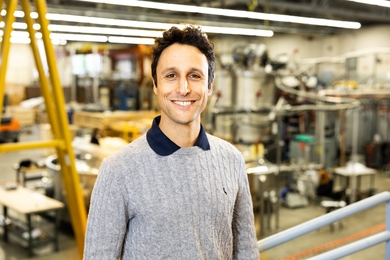Mitigating the stresses of graduate school requires dedicated community support and mentorship. Professors Wesley Harris, Anna Frebel, and Harry Tuller have been honored by graduate students as “Committed to Caring” for the manifold ways they demonstrate their respect for students.
Anna Frebel: listening and lifting up
Frebel says that “it is a gift to be able to tell, especially younger women, 'You can do it — I believe in you and your ideas.'”
Frebel joined the MIT physics faculty in 2012 as assistant professor and was promoted to associate professor of physics with tenure in 2018. Frebel is best known for her discoveries, and subsequent analyses, of the oldest stars in the universe. Her research offers insight into how these stars can be used to understand the first billion years after the Big Bang, the beginning of star and galaxy formation, and the origin of the chemical elements.
The career path of a woman in physics is bumpier than it should be. “I have seen too many cases where women have been left unprepared for what's to come because advisors were too busy or didn't care to share insight,” Frebel laments. To help address a lacuna in advising, Frebel developed a series of professional career development seminars to offer graduate women in MIT’s Department of Physics practical tools and insights on many unspoken topics and expectations in academia.
It is paramount for a department to develop policies to set expectations for peer behavior and community values while also, in Frebel’s words, “broadcasting that poor behavior in the workplace is never welcome in the first place.” For example, the Department of Physics has developed a list of Community Values. Frebel’s advocating for students is a mentoring guidepost identified by the Committed to Caring (C2C) program.
Frebel’s goal is to make time, demonstrate respect for her students, and to treat them as junior colleagues. Such behaviors, she says, “govern healthy relationships” between faculty and students. One student remarks that Frebel's “compassion and commitment to caring” have made the department a friendlier, stronger, and more inclusive place.
Wesley Harris: transcending boundaries
Professor Wesley Harris looks out for his students whether their struggles are research-related or personal. “Anytime I come across [Harris] in the hallway,” one student nominator writes, “I know I can always speak my mind and … get some insightful guidance and unwavering support.”
Wesley L. Harris is the C.S. Draper Professor of Aeronautics and Astronautics at MIT. Harris joined the MIT faculty in 1972. He has since served as associate administrator for aeronautics at NASA, as vice president of the University of Tennessee Space Institute, and as dean of the School of Engineering at the University of Connecticut. Harris’ research foci include fluid dynamics, unsteady aerodynamics, and aeroacoustics. His research extends beyond the field of aeronautics and astronautics to include the microcirculation and hemodynamics of sickle cell disease, as well as studies of lean financial management methods and the sustainment of capital assets.
In spring 2015, after MIT had witnessed several suicides on campus, Harris dedicated an entire lecture of his Analytical High Speed Aerodynamics course to talk about suicide with his students. Having such courageous conversations with students is a mentoring guidepost identified by the C2C program.
“I was truly touched by his effort to communicate, and I could tell he really cared,” one student remembers. “I had never seen a faculty member try this hard to bridge the divide [between faculty and students] until then, and I have not seen another faculty member try and do the same since.”
The relationship between a faculty mentor and their graduate student is one that requires mutual respect and trust. Harris notes that, especially initially, “the power balance favors the faculty member in the partnership. Hence, it is incumbent upon me to reach out to my students.”
Students in the Harris lab regularly present research updates to their lab mates. In these meetings, Harris and each attending student offer the presenter both critical and encouraging feedback. Harris affirms, “Our community is never a no-praise zone.”
Harry Tuller: encouraging and energizing
Keeping each of his students’ needs in mind, Professor Harry Tuller’s mentorship style is personalized and enthusiastic. As one student notes, he is “an amazingly kind and curious man, who is willing to help anyone who shows up and tries.”
Harry Tuller is the R.P. Simmons Professor of Ceramics and Electronic Materials in the Department of Materials Science and Engineering and director of the Crystal Physics and Electroceramics Laboratory at MIT. Currently, his research emphasizes modeling, processing, characterizing, and optimizing energy-related devices such as sensors, batteries, fuel cells, and solar/photolysis cells, as well as integrating sensor, actuator, and photonic materials into microelectromechanical systems. His research has been extensively published in over 485 articles, 15 co-edited books, and 33 patents.
When Tuller notices that a student is losing enthusiasm for their work, he reaches out to set up a meeting. Proactive outreach is a mentoring guidepost identified by the C2C program. One of his students had to take a break from school owing to anxiety and depression, and Tuller provided the necessary support for the student to get help. He later aided the student’s successful transition back into work.“[Tuller] met with me on multiple occasions,” the student said, “to help me parse through my own anxieties and concerns with anecdotes from himself and his past students.”
Every student responds to challenges and rewards differently, Tuller says, so it is important to provide advising suited to the individual. Learning what types of stressors affect each student can go a long way in alleviating anxiety-provoking situations for students and in helping students manage their own stress.
In order to keep moving forward, Tuller urges students to “communicate their research goals clearly and convincingly and to be open to constructive criticism.” Tuller’s consistent contact and tailored support has contributed to his students’ resounding success.
More on Committed to Caring
The Committed to Caring program is an initiative of the Office of Graduate Education and contributes to its mission of making graduate education at MIT “empowering, exciting, holistic, and transformative.”
C2C invites graduate students from across MIT’s campus to nominate professors whom they believe to be outstanding mentors. Selection criteria for the honor include the scope and reach of advisor impact on graduate students’ experience, excellence in scholarship, and demonstrated commitment to diversity and inclusion.
By recognizing the human element of graduate education, C2C seeks to encourage excellent advising and mentorship across MIT’s campus. More information about these and other C2C honorees and their advising practices may be found on the Committed to Caring pages.



